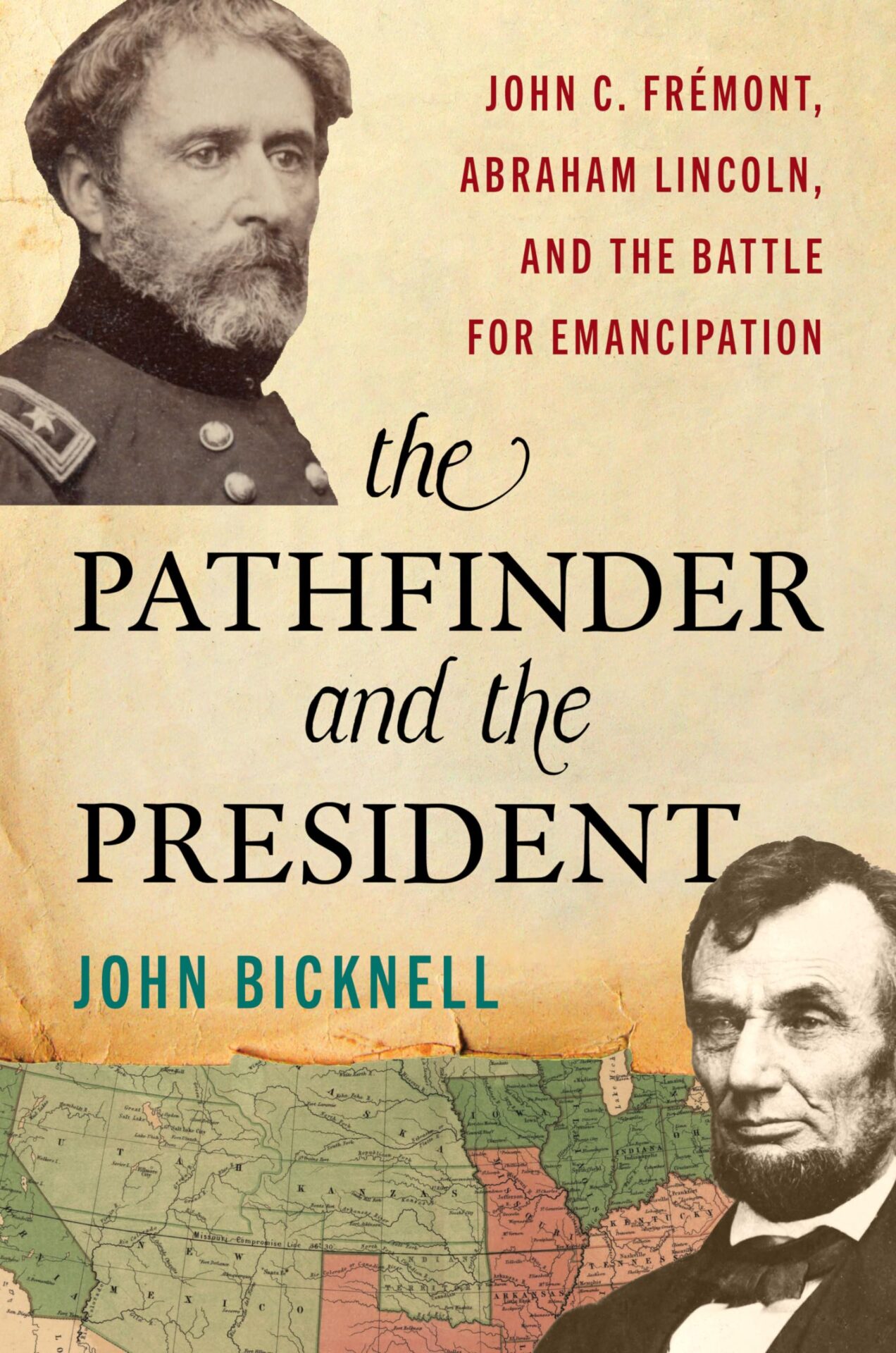Book Review: The Pathfinder and the President: John C Frémont, Abraham Lincoln, and the Battle for Emancipation
The Pathfinder and the President: John C Frémont, Abraham Lincoln, and the Battle for Emancipation. By John Bicknell. Essex, Connecticut: Stackpole Books, 2025. Hardcover, 365 pp. $32.95.
Reviewed by Danny Brennan
Jessie Benton Frémont did not let things go easily. Nearly thirty years after the end of the American Civil War, she wrote a letter lamenting the country’s sanctification of President Abraham Lincoln as the sole savior of the Union and “Great Emancipator.” As she wrote in an 1893 letter, “Mr. Lincoln’s cruel death silenced the truth, and since then, he has been shaped and exalted into such ‘a faultless monster as the world ne’er saw.’” (283) Such myth-making left no room for other heroes who served the Union cause—chief among them her late husband, John C. Frémont.
John Bicknell’s The Pathfinder and the President contextualizes this resentment in a thoughtful analysis of John Frémont’s wartime career and relationship with the Commander-in-Chief. Both titular figures emerged from humble beginnings, rose to Republican Party leadership, and fostered emancipation. But from there, the men’s temperaments diverged sharply. Frémont, the explorer-turned-politician, gained fame long before the Illinois lawyer did—and embraced abolitionist military policy earlier. Their divergent paths led to public clashes, particularly over the limits of federal wartime authority. Bicknell asserts that Frémont’s ambition “served only itself,” meaning that his early anti-slavery drive stemmed from hubris rather than humanitarianism. (2) Still, Frémont pushed the administration to a more progressive stance. By 1862, the author claims, “Lincoln was coming around to Frémont’s view of the war and emancipation’s role in winning it.” (181)
In centering Frémont’s Civil War experience and arguing that the Pathfinder influenced the president’s thinking, Bicknell ties together some loose threads in the existing scholarship. Works about Lincoln’s antislavery progression, such as Eric Foner’s The Fiery Trial (2011) and James Oakes’s The Crooked Path to Abolition (2022) rarely mention Frémont outside of his 1861 emancipation edict. Recent biographies about the Frémonts, including Tom Chaffin’s Pathfinder (2014) and Steve Inskeep’s Imperfect Union (2020), pay the Civil War diligence, but prefer to focus on John and Jessie’s colorful antebellum lives. By focusing on the couple’s wartime experiences, Bicknell’s work connects and expands on multiple scholastic trends.
Through his dual portrait of Frémont and Lincoln, Bicknell demonstrates the complexities of Civil War-era politics. The two men served as the Republican standard-bearers for three election cycles—1856, 1860, and 1864—but each represented a different bloc within the party. Bicknell labels the president “at heart…a conservative.” (1) While such a claim is historiographically controversial, he justifies it by noting Lincoln’s connection to the conservative Blair clan, whose personal jealousies transformed an early war support for Frémont into hatred for the Pathfinder.
After committing the “capital offense” of offending the Blairs, Frémont found favor in radical circles. (146) His 1861 emancipation edict and willingness to confront Lincoln’s moderation made him a darling of abolitionists, who backed his 1864 presidential run in the Radical Democracy Party. President Lincoln played better politics and co-opted some important abolitionists, compelling Frémont to end his campaign before it effectively started.
This volume serves as an analysis of wartime power, particularly when it came to political fights and, as the subtitle suggests, “The Battle for Emancipation.” Any mention of Frémont’s military campaigns as head of the Department of the West and Mountain Department is used as a springboard for those political conversations, rather than a detailed analysis of the officer’s strategic or tactical thinking. Bicknell argues that the Pathfinder was far from a talented commander and that Lincoln’s “mistake…was not in dismissing Frémont but appointing him in the first place” (145). Additional analysis of this general’s military experiences and field leadership would perhaps help substantiate this point.
Bicknell displays a clear understanding of material related to Frémont’s life. His book combines a wide range of sources, including correspondence, diaries, newspaper articles, and legislative records. His method marks an improvement from an already impressive prior book, Lincoln’s Pathfinder (2017), which examines the election of 1856. That said, Bicknell’s 2025 work could have benefited from some of the context that his 2017 volume provides. The eleven-page prologue that examines John and Jessie Frémont’s antebellum careers simply does not provide enough room for readers to understand why the couple was such a force to be reckoned with. (3-13)
Jessie Frémont understood the power that myths had in American society. Like her, John Bicknell recognizes that Lincoln did not act alone. But he does not go so far as to mythologize Jessie’s husband. His book sees John Frémont as a lackluster commander, a powerful egotist, a grudge-holding figure, but also a man who promoted a progressive vision of society and recognized that justice required more than what the “Great Emancipator” initially offered. The work adds nuance to our understanding of emancipation, leadership, and the fractious politics of the Civil War era. Neither the Pathfinder nor President was “a faultless monster as the world ne’er saw” (283). Bicknell’s study is all the stronger for showing us why.
Danny Brennan is a PhD student at West Virginia University who works as a seasonal ranger at Gettysburg National Military Park. He is interested in exploring the Union Army in war and memory, focusing particularly on chaplains, Ohioans, and Twelfth Army Corps soldiers.


Excellent review. I’ll have to add this one to my reading list
Great review! Jessie Frémont was quite the bully for herself and her husband.